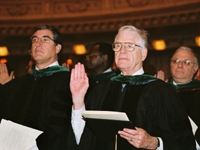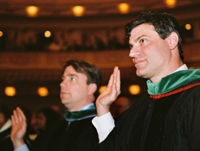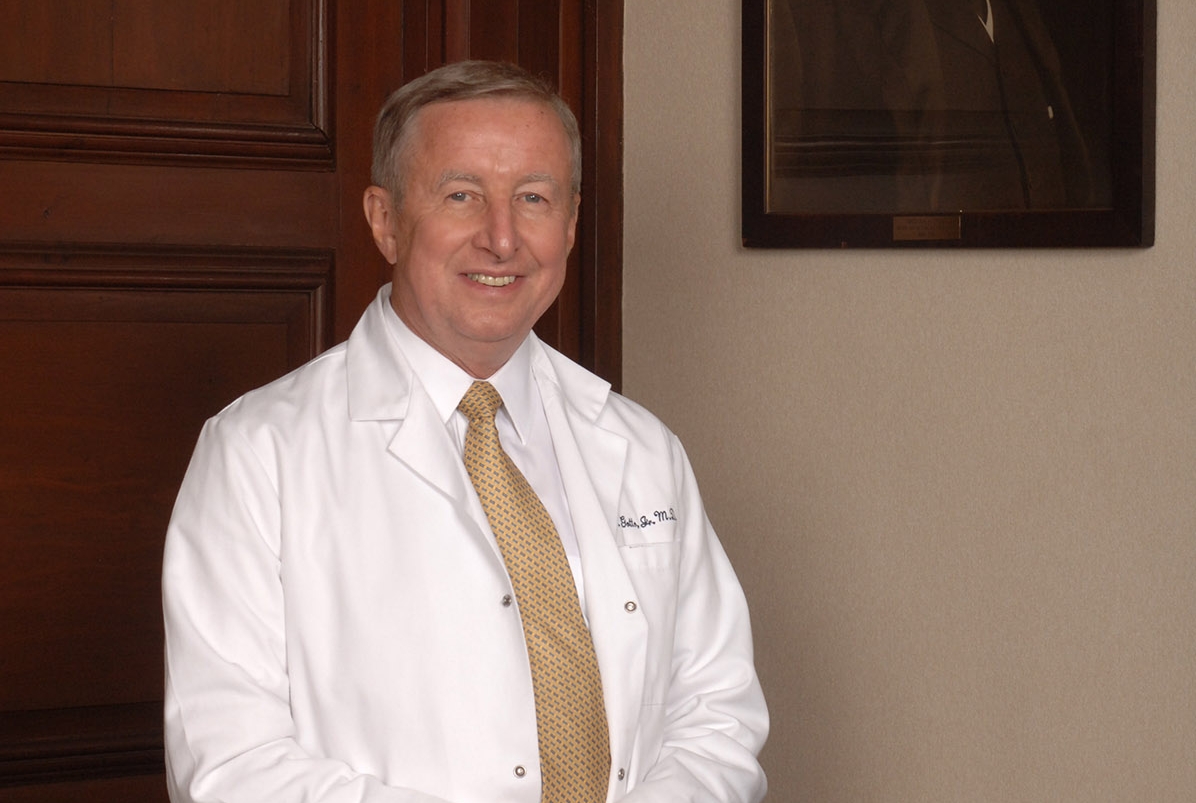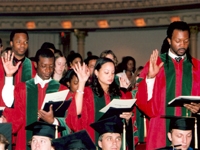Revisiting a hallowed ritual in medical education, a special committee within the Medical College convened this spring to craft an updated version of the Hippocratic Oath. Written in ancient Greece, the Oath expresses principles still fundamental to the practice of medicine today. Over the years, it has become a poignant rite of passage for new doctors to take some form of the oath as they graduate from medical schools across the country.
On June 1, 2005, the new oath was unveiled at Commencement ceremonies for the Weill Cornell Medical College and Graduate School of Medical Sciences. After Dr. Antonio Gotto, dean of the Medical College, administered the new oath to the graduates, he invited the medical faculty and other physicians present to stand and recommit themselves to the oath's principles by raising their right hands.
"With this gesture," Dean Gotto said, "we will join our new colleagues in affirming the values that guide both our work and our lives."

Dr. Peter Scardino and Dr. E. Darracott Vaughan (front), with Dr. Estomih Mtui and Dr. Rubin Cooper (rear), rededicate themselves to the principles expressed in the new oath.
The original Hippocratic Oath has been revised many times to reflect changes in medical practice. Historically, these revisions have been undertaken by individuals or professional associations. The new Weill Cornell oath is distinctive because it represents an institutional effort. Consisting of faculty from both the New York City and Doha campuses, the 20-member Dean's Committee on the Hippocratic Oath included two senior associate deans, two associate deans, and three department chairs. Two student leaders, one from New York and one from Doha, were also included. At the request of Dean Gotto, this representative committee was headed by Dr. Joseph Fins, chief of the Division of Medical Ethics and professor of medicine, public health and medicine in psychiatry.
In forming the Hippocratic Oath committee at the start of the spring semester, Dr. Gotto asked its members to reconsider the version used by Weill Cornell and decide whether it should be revised to reflect contemporary issues, such as social justice in medicine, that would enhance the oath's relevance for today's graduates.
"The age-old precepts of the Hippocratic oath have connected generations of physicians since antiquity," Dean Gotto said. "At the same time, evolving medical practice presents new issues that we must address, and duties that we must embrace. Given the profound changes affecting medicine today, we wanted to modify the Weill Cornell version of the oath to create one that is relevant, meaningful, and inspirational, while reaffirming our bond with the noble traditions of our profession."
The committee first met in February 2005 to discuss the core values of the oath in the context of 21st-century medicine.
"Our goal was to preserve the enduring precepts and obligations of doctoring, but also make the oath reflective of some of the current challenges that the health-care system faces today, trying to balance the old with the new," Dr. Fins said. "We had to express the core principles in a more modern way; otherwise it becomes platitudinous."
Dr. Daniel Lerner and Dr. Mark Pochapin reaffirm their commitments to the oath.
The committee members took a scholarly, systematic, and inclusive approach, enriching their knowledge with background reading and categorizing the key elements of earlier medical oaths, including the classical Hippocratic Oath, a well-known 1964 revision by Dr. Louis Lasagna, the Oath of Maimonides, and an oath for Muslim physicians.
"The work of the committee provided an opportunity for faculty to review various versions of the oath," said Dr. Carol Storey-Johnson, senior associate dean of education and a member of the committee. "It was remarkable how different the versions were, clearly reflecting attempts over time to address issues of evolving relevance in the practice of medicine."
The committee also considered the history of medicine, the enduring principles of medical practice, and the profound social and scientific changes affecting the profession today.
New emphases in the revised oath address the doctor's responsibilities and duties to serve as advocate for their patients, champion social justice for the sick, and forge strong bonds throughout the healing process. For example, in the previous version of the oath, doctors pledge to "withdraw in favor of others when they are more expert." The new version recognizes the importance of calling upon experts, but includes a pledge that "I will not withdraw from my patients in their time of need." By remaining involved and accessible, even after referral to a specialist, doctors can mitigate any feelings of isolation or abandonment on the patient's part.
"We certainly endorse the old notion of deferring to someone with more expertise," Dr. Fins said. "But we also wanted to capture the notion that there is a value to a longstanding doctor-patient relationship, and that itself is therapeutic."
The oath reaffirms a "sacred trust" between doctors and patients, reminding doctors to "use their power wisely." It also fosters trust and respect within the profession by including a pledge to help sustain colleagues in their service to humanity. In a culture preoccupied with wealth and power, the oath serves as an antidote to professional arrogance, obligating doctors to practice humility and self-awareness, accept their limitations, and pursue lifelong learning to better care for the sick and prevent illness.
In addition to content, the committee examined the language of the oath. "We wanted to be respectful of the diversity of perspectives on faith and belief," explained Dr. Fins, "and to be mindful that there are a number of ways to express personal commitment." With this in mind, the members chose to replace phrases that have a religious connotation with more ecumenical expressions, such as changing "I swear" to the more secular "I vow." In addition, the words "I will be loyal to" were modified to "I will honor," which suggests a personal resolve to uphold traditions and values.
It was also important to achieve a balance between archaic and modern forms of expression. "I think the committee worked in a very positive way to carefully consider the new language and retain the literary elegance of the ancient oath," said Dr. Storey-Johnson.
The revised oath ends on a more positive note than the classical version, which threatens retribution for any doctor who transgressed the oath and swore falsely. Revised, it reads: "I now turn to my calling, promising to preserve its finest traditions, with the reward of a long experience in the joy of healing." It concludes: "I make this vow freely and upon my honor," again underscoring personal responsibility as a guidepost in one's profession.
Dr. Fins and Dr. Gotto expressed their gratitude to the committee for making this mission a truly collegial process.
"It was so invigorating to have a group of colleagues together, talking about these important issues, and thinking deeply about why we're here and what we're doing," Dr. Fins said. "It helped reconnect us as a group, and I hope it will encourage our broader college community to recommit to the values embodied in the oath."
Weill Medical College of Cornell University Dean's Committee on the Hippocratic Oath
Chairman: Joseph J. Fins, MD
Membership
- Elizabeth A. Alger, MD
Senior Associate Dean for Education
Weill Cornell Medical College in Qatar - Khalid A. Al-Khelaifi
Representative (inaugural class)
Medical Student Executive Council
Weill Cornell Medical College in Qatar - Bruce L. Ballard, MD
Associate Dean for Student Affairs and Equal Opportunity Programs
Office of Student Affairs
Associate Professor of Clinical Psychiatry
Weill Cornell Medical College - Jack D. Barchas, MD
Barklie McKee Henry Professor
And Chairman
Department of Psychiatry
Weill Cornell Medical College
Psychiatrist-in-Chief
Weill Cornell Medical Center/NewYork-Presbyterian Hospital - Frank A. Chervenak, MD
The Given Foundation Professor
And Chairman
Department of Obstetrics and Gynecology
Weill Cornell Medical College
Obstetrician/Gynecologist-in-Chief
Weill Cornell Medical Center/NewYork-Presbyterian Hospital - James L. Clarke, MD
Clinical Assistant Professor of Surgery
Weill Cornell Medical College - Jessica G. Davis, MD
Associate Professor of Clinical Pediatrics
Weill Cornell Medical College
Co-Director, Division of Human Genetics
Department of Pediatrics
Weill Cornell Medical Center/NewYork-Presbyterian Hospital - Donna M. DiMichele, MD
Associate Professor of Pediatrics and Public Health
Weill Cornell Medical College - Oliver T. Fein, MD
Associate Dean, Office of Affiliations
And Office of International Medical Education
Professor of Clinical Medicine
Professor of Clinical Public Health
Weill Cornell Medical College - Joseph J. Fins, MD (Chairman)
Chief, Division of Medical Ethics
Professor of Medicine
Professor of Public Health
Professor of Medicine in Psychiatry
Weill Cornell Medical College - The Reverend Curtis W. Hart, M.Div.
Director of Pastoral Care and Education
NewYork-Presbyterian Hospital
Lecturer in Public Health, Medicine, and Psychiatry
Division of Medical Ethics
Weill Cornell Medical College - Paul D. Kligfield, MD
Professor of Medicine
Division of Cardiology
Department of Medicine
Weill Cornell Medical College - Alvin I. Mushlin, MD, ScM
Chairman, Department of Public Health
The Nanette Laitman Distinguished Professor of Public Health
Professor of Medicine
Weill Cornell Medical College
Public Health Physician-in-Chief
Weill Cornell Medical Center/NewYork-Presbyterian Hospital - Pablo Rodriguez del Pozo, MD, JD, PhD
Assistant Professor of Medical Ethics
Weill Cornell Medical College in Qatar - Mustapha Saheed
President, Class of 2005
Weill Cornell Medical College - David A. Silbersweig, MD
Vice Chairman for Research
Department of Psychiatry
Director, Division of Neuropsychiatry
Co-Director, Functional Neuroimaging Laboratory
Director, Neurology/Psychiatry Dual Residency Program
Associate Professor of Psychiatry
Associate Professor of Neurology and Neuroscience
Weill Cornell Medical College - Carol L. Storey-Johnson, MD
Senior Associate Dean for Education
Office of Academic Affairs
Associate Professor of Clinical Medicine
Weill Cornell Medical College - Judy Tung, MD
Assistant Professor of Medicine
Co-Director, Primary Care Internal Medicine Residency
Weill Cornell Medical College - Milton Viederman, MD
Emeritus Professor of Psychiatry
Weill Cornell Medical College
Lecturer in Psychiatry
Columbia University College of Physicians and Surgeons
Antonio M. Gotto Jr, MD, DPhil
The Stephen and Suzanne Weiss Dean
Professor of Medicine
Weill Cornell Medical College
Provost for Medical Affairs
Cornell University
Staff
Paula Trushin
Editorial Office of the Dean
Photos by Janet Charles.


